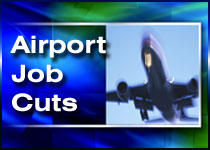
Airport chiefs: Proposed screener cuts a bad idea
Senate measure would cut 6,000 TSA workers
By Thomas Frank
USA TODAY
Airline passengers will face longer airport security lines starting
this fall if Congress goes through with plans to cut up to 13% of the
nation's checkpoint screeners, a top Transportation Security
Administration official said Thursday.
Thomas Blank, TSA's acting deputy administrator, said the Homeland
Security Department is fighting a Senate spending measure that would
cut 6,000 of the agency's 45,000 screeners.
The House voted to cut 2,000 screeners in the budget that takes effect
Oct. 1, Blank told a Capitol Hill hearing.
Rep. Hal Rogers, R-Ky., chairman of the House subcommittee that
oversees Homeland Security funding, disputed Blank's figures and said
the House is not cutting any screeners but is cutting unnecessary
management costs.
Airport directors predicted enormous lines if 6,000 screeners are cut
as air travel hits record levels.
“There's no one who's going to get through a checkpoint in 10 minutes,”
William DeCota, aviation director at Kennedy, LaGuardia and Newark
airports, said afterward.
Ben DeCosta, manager of Atlanta's Hartsfield-Jackson International
Airport, said the TSA told him Tuesday that the airport would lose
several hundred screeners under the Senate plan.
“I'm concerned that the lines would be over an hour and would go around
the building, through baggage claim, out the door and down the
sidewalks,” DeCosta said.
Blank told the panel that “very crowded airport lobbies are a security
threat” because so many people could be an inviting target for
terrorists.
The Senate slashed 6,000 screeners after rejecting an administration
proposal to add a $3 fee to airline tickets to help pay for aviation
security. Earlier this month, Sen. Robert Byrd, D-W.Va., called the
cuts “very unfortunate” and blamed them on a budgetary misunderstanding
about the process for raising fees.
The House plan cut 5% from the administration's proposal for screeners
but added $40 million to buy automated luggage-scanning machines that
require far fewer screeners to operate than are needed to handle manual
machines now in many airports.
Rogers said he was “pushing TSA to install next-generation
technologies” that would improve bomb detection in luggage, speed up
screening and cut personnel costs.
Rep. Norm Dicks, D-Wash., criticized the administration for not seeking
more money to meet airport demand for automated luggage scanners.
“There is a chance here for major savings,” Dicks said.
TSA's Blank said increased air travel is generating more fees for
airports, which “are sitting on some cash that they can invest” in
security.
Blank testified the same day the TSA announced its annual
redistribution of screeners at the 441 airports where it provides
security. Airports will gradually lose or gain screeners in coming
months.
The big winners: Las Vegas' McCarran International Airport, Houston's
Intercontinental and Los Angeles International Airport, which opened
seven new security lanes this month to alleviate some of the longest
lines in the USA. “It will be a great help,” LAX spokesman Tom Winfrey
said.


No comments:
Post a Comment